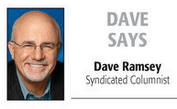Can we have accountability without armageddon?
Published 1:44 pm Friday, January 25, 2019
By KATE SNYDER
Life with a Smile
Well, the world went temporarily insane again last week. It seems to be an alarmingly-routine occurrence. Video surfaced of a group of high school students, proudly sporting red Make America Great Again hats, taunting a Native American man at a large rally in Washington, D.C. At least, that’s what I saw. In the hours that followed, more videos were released, statements were read, tempers flared, and accusations hurled. There were narratives and counter-narratives, extended videos, new videos, and vitriolic tweetstorms.
It was a mess.
As the response played out in my social circles, I saw a couple very different themes emerge from mom friends at varying ends of the political spectrum. These responses eerily mirrored the narratives that emerged several months ago during the Kavanaugh confirmation hearings. Both centered around how we would feel if our boys ever found themselves at the center of a firestorm like this. The two camps could roughly be described as: “I hope my son is never treated like a monster on national television” versus “I hope my son never behaves like a monster on national television.”
Although I find myself in the latter camp, I do understand the instinctive alarm of the former. The students from the video received death threats and the school had to take down its online presence because of the tsunami of rage directed its way. That is absolutely appalling.
And yet. When you behave like an entitled, racist jerk in public, some blowback seems appropriate. But how much blowback?
How do we find a balance, in our current world of viral connectedness and seething anger, between calling out unacceptable behavior and unleashing a virtual hit squad? Is it possible to have accountability without Armageddon?
By the time a situation hits the national stage, it’s too late. Poor judgment exacts a much, much higher cost when it is viewed by millions of strangers. Armageddon feels inevitable by that point. We need to start sooner, rewind the tape to an earlier point in the narrative.
When I expressed skepticism about an explanatory statement released by the main student perpetrator, a friend demanded, “Well, what would you have him do?” To which I, somewhat flippantly, replied that perhaps the first step would have been to encourage the young man not to wear openly racist clothing in public. It was a throwaway answer, meant to be snarky rather than useful, but it’s not entirely wrong.
I actually think we can find some illumination in the new ad for Gillette razors (which is also, incidentally, making folks lose their minds). In the ad, you see men gently holding each other accountable for relatively small infractions. A dad separates two boys who are wrestling. A young man says “not cool” to a friend who is ogling a woman walking by.
Small course corrections can add up over time to larger shifts in our collective thinking. Saying to a young man — “hey, that hat you’re wearing carries some pretty ugly baggage. You might want to re-think it” — is a small, but powerful act of accountability. It doesn’t have to be a MAGA hat. Maybe it’s a sexist T-shirt or a homophobic joke. Let’s start there.
I also got hammered for using the phrase “white privilege” in conversations about the online incident. How could I judge those poor children for the color of their skin? Didn’t I realize that my own sweet baby might one day be seen as a privileged white boy?
Look friends, here’s the thing — and this is important, so I want to be clear. My son is a privileged white boy. There is no “maybe” about it, no room to argue. This isn’t a topic about which we can agree to disagree. His race conveys privilege. His gender conveys privilege. His socio-economic status conveys privilege. These are facts.
Being a privileged white boy is not, by itself, a character flaw. Truly, it’s not. But abusing that privilege? Taking that privilege and twisting it into entitlement? Walking through the world believing that your opinions and your needs and even your body are more important than those around you? Now those are character flaws.
So no, I don’t spend a lot of time worrying about how to protect my son from false accusations of sexual misconduct or how to save him from the “reverse racism” of the progressive left. I worry about how to protect him from the insidious messages of toxic masculinity and entitlement. I worry about providing him with accountability now, when he’s young and the stakes are lower, so that when he grows up, I am less likely to see him plastered over the Internet as the latest poster boy for unacceptable male behavior.





